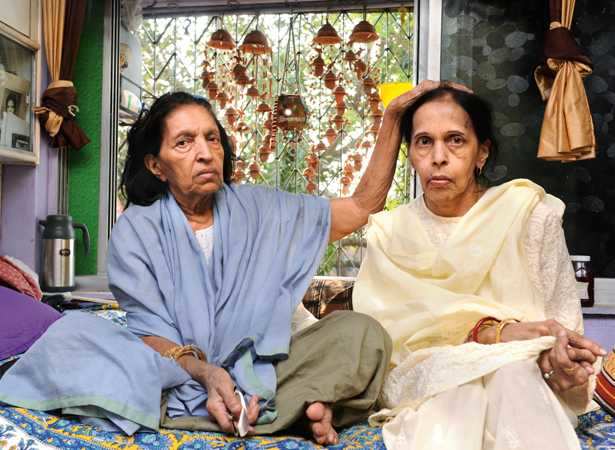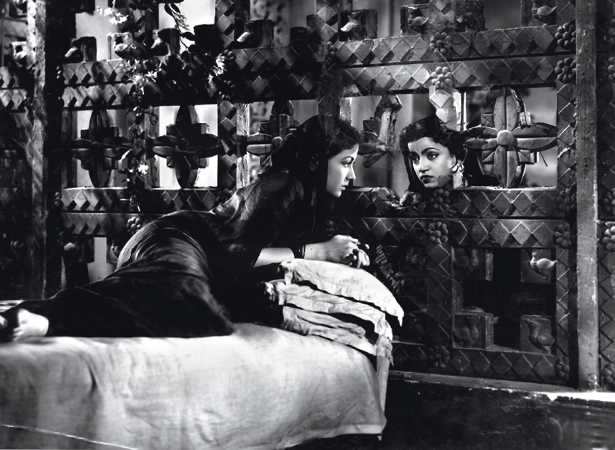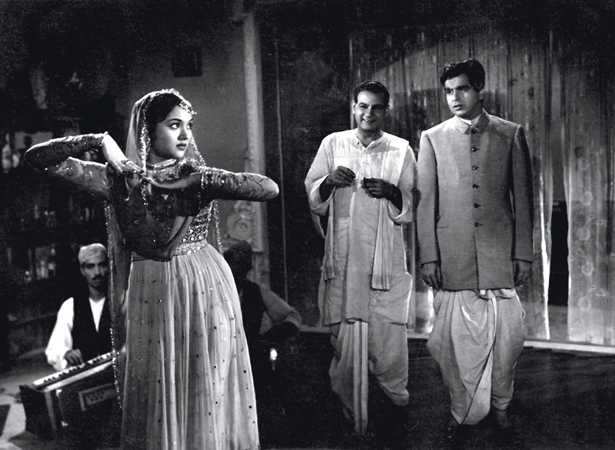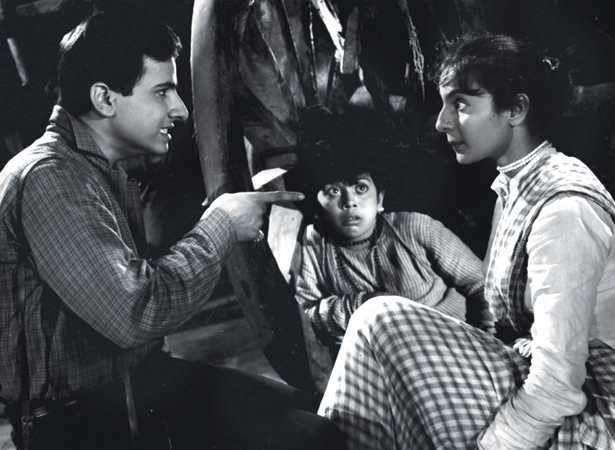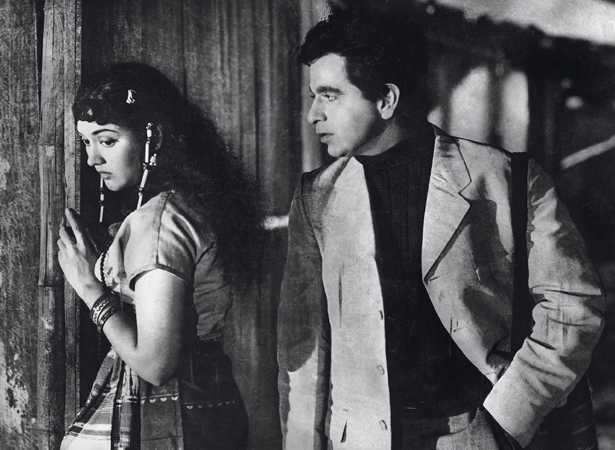Khiza ka rang kabhi nazar se door na huwa (The shade of autumn never went out of sight)
Kati hai umar baharon ki arzoo karte karte (I have spent a lifetime waiting for spring)
Singer Mubarak Begum recites the couplet to describe the past decades spent in strife and despair. Ironically, her most popular, pathos-laden number Kabhi tanhaiyon mein yoon hamari yaad aayegi, which she sang for Kidar Sharma’s Hamari Yaad Aayegi, seems to somewhere echo her present disenchantment with the industry and fans who once patronised her. Life stopped making music for the veteran singer in the 1960s, when work suddenly stopped coming her way. She alleges career sabotage. “I stopped getting work from 1965. Some leading singers didn’t want me to succeed. My records used to be sold out even before the films released. But slowly my songs were cut out. They made sure I got no work. They threw me out,” says the singer who has sung for eminent composers including SD Burman, Naushad, Kalyanji-Anandji, Jaidev and SN Tripathi through the ’50s-’60s.
Survival woes
First pushed into poverty and later even physical incapacity (due to a back injury), she can now barely move. Her congested flat in Jogeshwari (a suburb of Mumbai) is strewn with belongings, her bed occupying most of the space. Just below her bed a mattress has been placed for her 40-plus daughter Shafaq Banu, who suffers from Parkinson’s disease. I wonder whom fate has been harsher to. The 70-plus ailing singer or the young girl reduced to an invalid and traumatised by familial strife and want. Close on the heels of the AK Hangal story, where the veteran pleaded for help from the government and the industry, comes Mubarak Begum’s plight. She hopes that after reading her story, industry persons will come forward to help her. “I’ve sung for actresses including Nargis, Nadira, Meena Kumari and Helen. I’m grateful to the industry for all they gave me. But once I was out of work, nobody cared. The Government earlier sent me Rs 1500, now it’s Rs 3000. Some fans send me money. But it’s not enough. I feel humiliated. Wherever there’s a Mohammed Rafi concert, I participate. I’m taken in an armchair. But I can’t be part of reality shows and fight like them.” She continues, “It’s difficult to pay the gas, maintenance and electricity bills. My daughter can’t eat normal meals. She has to be given fruit. We can’t afford it. At least Rs 10,000 is needed for her medical expenditure. My son runs a private taxi. He has four daughters. I don’t take help from him.”
Making music
The Rajasthan-born Mubarak Begum grew up in Ahmedabad. “My Abbaji (father) and Bade Abba (uncle) were fruit sellers. I’d insist that they take me along for movies. But once the lights went off, I’d fall asleep. But I loved music. It was impossible to sing like Noor Jehanji. I was inspired by Suraiyaji and sang her numbers like Door papiha bola (Gajre) and Panchi ja (Mehtab). She sang in a seedhi seedhi (simple) style. There was no banavatipan (artifice) in her voice.”
After a while, her father tired of his meager income, decided to bring little Mubarak to Mumbai to test his luck and her talent. She began singing ghazals on AIR during the ’50s. Composers Rafique Ghaznavi Khan and later Ram Daryani offered her film songs. But being just about 11, young Mubarak was overcome by mike fright. Her break eventually came with the song Mohe aane lagi angrayi (Aaiye) for composer Shaukat Dehlvi. Later she also bagged seven songs in Kamal Amrohi’s Daera (1953). Unfortunately, the film tanked and her songs didn’t get their due. Her big moment came when she sang in Bimal Roy’s Devdas (1955). “I was first given just two lines, Woh na aayenge palatkar, unhein lakh hum bulaayein. These were to be repeated over and over again. Sahir saab (Ludhianvi, lyricist) loved the way I sang them and wrote a full song instead. Burmanda (late composer S D Burman) was pleased and praised me. All I could remember at that time was how he had earlier dismissed me saying, ‘Awaaz polish karo (polish your voice)!’.” After this came another Bimal Roy hit — the song Haal-e dil sunayege in Madhumati (1958).
Happy tunes
She recalls some memorable moments. Like the time she sang her hit number Mujhko apne gale laga lo (Humrahi) at the Filmfare Awards in the ’60s. “I happened to get that song as a top singer didn’t turn up for the recording. It was the theme song of Humrahi. When she got to know that I had sung it she objected. But Jaikishenji said that he wouldn’t have anyone else sing it. For the Filmfare function, I went to Kashmir Emporium and got myself a beautiful saree.” She adds, “Once I performed at Rang Bhawan with Talat Mehmood and Manna Dey. People were sitting on cars outside the venue to hear me. My Woh na aayenge palatkar met with deafening applause. I still have the shawl I was honoured with.” She shared a warm relationship with her Daera heroine Meena Kumari too. “Meenaji liked the kurtas and the Rajasthani mojris I wore. So I’d get them for her. Once she got me an off-white sari with a purple border. It proved very lucky for me. Whenever I wore it, the recording went off smoothly,” she says. “But she was a sad person. She missed being a mother. She had a romantic temperament and was often betrayed. No one was with her during her last days.”
She also recalls the moment when she recorded the number Kabhi tanhayiyon mein. “At the recording, Kidar Sharma sat with his eyes closed till the song was done. He then got up and gave me four annas. When I hesitated, composer Snehal Bhatkar told me, ‘Take it. Whoever he gives money to makes a name.’ The song became famous. People would put four annas in the jukebox and hear it all day long. They’d place bets as to who had sung it, Lata Mangeshkar or me.”
Discordant notes
But there’s lots that has left her embittered. While she maintains that the late singer Geeta Dutt “never made fun of any singer”, others did. “They’d laugh and distract me, so that
I wouldn’t get it right and was made to leave. On another occasion, I got a phone call. I didn’t recognise the voice and asked who it was. She replied, “Hum woh hai jo jab chahe tumhe industry se nikal sakte hain (I’m the one who can get you thrown out of the industry). She then started laughing and revealed her identity. She had conveyed what she wanted to. Once during Ramzan (a month when Muslims do charity) I received an envelope containing Rs 500. The address was that of a leading singer. I was taken aback at the meager amount but I kept it as a shagun (auspicious token). I called her up to say so. But her sister picked up the phone. I couldn’t help saying, ‘If you wished to help, you could’ve sent something more’. She replied, ‘Hamara bhi pura nahin padta (we find it difficult to meet our expenses)’.”
She continues her angst, “The world knows who didn’t let me succeed. I took to singing to look after my family. I didn’t come here for name or fame. My songs were dropped from films or sung again by someone else. They did this with many artistes. They said, ‘If you make so and so sing, we’ll never sing for you’. The composers would get scared. They had no faith in themselves.” Ultimately a depression-ridden Mubarak Begum says she began resorting to sleeping tablets. “I was taken to a psychiatrist as I had become numb and withdrawn. Meri rozi par asar padha tha (My bread and butter was snatched away).”
She recalls the humiliation she went through for survival. “I went to Rajendra Mehta’s (ghazal singer) house asking to be part of his shows. But he said he had no work for me. I even approached Nitin Mukesh and Tariq Hussain to let me be part of their shows but they also declined. Music companies like HMV give me no royalty. The leading singers were smart and had managed to get it granted for themselves.” One person she’s all praise for is Hridaynath Mangeshkar. “I like his Marathi compositions. Once I was asked to perform with him. When I went there, he quietly put an envelope of money in my purse without my asking for it. He’s that well-mannered.” She also speaks highly of Javed Akhtar through whose efforts she could procure this flat granted by the Chief Minister’s quota for artistes. And it’s instances like these that reinforce her belief in goodness and a better tomorrow. “You complain to those you love, don’t you?”
Mubarak Begum’s popular songs
Kabhi tanhaiyon mein
Hamari Yaad Aayegi
Mujhko apne gale lagaa lo Humrahi
Bemurrawwat bewafa begana dil
Susheela
Haal-e dil sunayege
Madhumati
Woh na aayenge palatkar
Devdas
